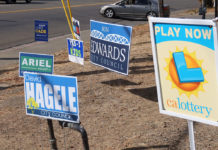Sebastopol’s future
Editor: The City Council will hold a special “round table” meeting at City Hall on Tuesday, Jan. 29, to set goals for the year 2013 and beyond. The start time is 1 p.m. and the anticipated end time is 4 p.m. This is a public meeting and there will be opportunities for the public to comment and participate. I invite all interested folks to attend.
The Community Meetings regarding the SSU students’ work on our General Plan Update have been well attended, with 20 to 40-plus people, from “both sides of the aisle.” The creative brainstorming is dissolving those “sides” and bringing us together to work for our community’s good.
Come Jan. 29 and let the Council know what you think are our top priorities, so we can join hands and get to work the next day. I hope to see you.
Sarah Gurney
Sebastopol
Save the bunya bunya
Editor: The bunya-bunya tree at Sebastopol Avenue and Morris Street is heavily used for nesting by house finches and gold finches. The nearby palm trees are also well used by birds. Please do not allow the removal of these trees.
Norman Hill
Sebastopol
Archaic idea
Editor: I would like to commend our entire City Council (and particularly, Patrick Slayter, who proposed the idea) for recently passing the moratorium on drive-thrus. By doing this, this council has taken an important step in ridding us of an ill-conceived idea whose time has passed.
I, like many of you, have used drive-thrus at some point in my life. I’m old enough to remember when the concept was first developed. They were kind of neat when they were new, but we are so much smarter now. They are environmentally harmful, aesthetically displeasing and — when too many people decide to use them at the same time — a major inconvenience, which is the exact opposite of why they were conceived in the first place.
In short, they have become obsolete.
Many times, drivers do not turn their engines off once they have entered and stopped, and this, of course, produces copious amounts of carbon monoxide. And who among us has not had the carcinogenic experience of getting stuck behind a diesel truck or other vehicle that has entered a drive-thru and has been left idling while its occupant conducts business? I have, and I can tell you that it is not a pleasant experience.
This is not meant to “dis” diesels. Rather, the point is to illustrate how environmentally wicked these once well-intentioned conveniences of modern living have become.
And who can honestly say they have ever seen a beautiful drive-thru that contributes culturally, aesthetically or environmentally to the community? Maybe there’s one out there somewhere, but I have yet to see it.
We need to get people out of their cars. Better yet, we need to get those who live close by, to walk. Eliminating drive-thrus is an important first step to accomplishing both of these goals.
One final thought: Now that responsible planning is in our view, let’s finally say adios to the drive-thru.
Thomas D. Bonfigli
Sebastopol
‘Robin Hood’ tax
Editor: Having just written another personal check to the U.S. Treasury, I had an idea to share. There is an unnoticed way to raise revenue, the Robin Hood Tax. A Robin Hood Tax also is suggested for stock exchanges in Europe, especially the Common Market countries.
How it works is simple. Each new stock, bond or derivative transaction would involve a tiny tax which would go directly, no stings attached, to the U.S. Treasury. The Robin Hood tax might be 25 or 50 cents on each separate trade. With the huge volume of business done each day, it could bring in as much as $350 billion in new revenue each year.
Another desirable side effect would be that giant banks — J.P. Morgan Chase, BankAmerica, Wells Fargo and hedge funds — together with their henchmen, might think twice before executing the massive amount of late-session trades which bring about late-session losses and volatility on Wall Street. The Robin Hood tax would work to the benefit of small investors. The Robin Hood Tax would help us out of the trade imbalance and the debt crisis; keeping some of Uncle Sam’s hard-earned money right here in the good ol’ U.S., where it belongs.
Frank Baumgardner
Santa Rosa
50.5
F
Healdsburg
November 23, 2024






